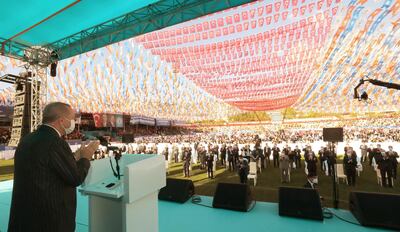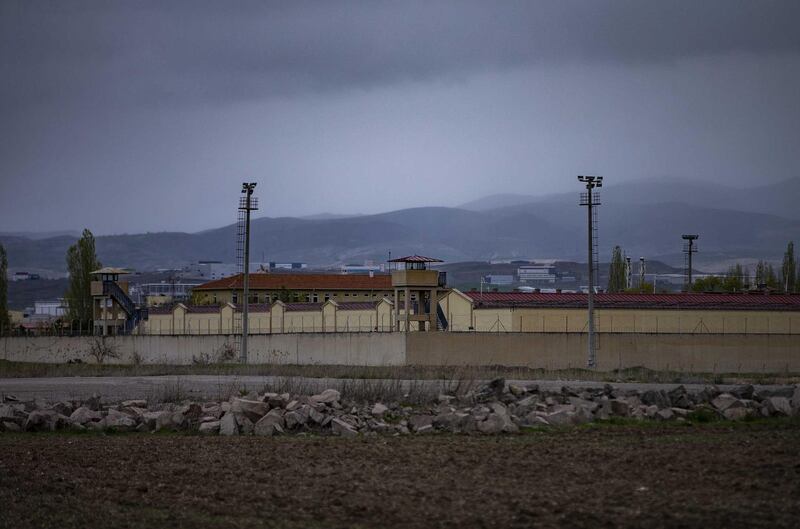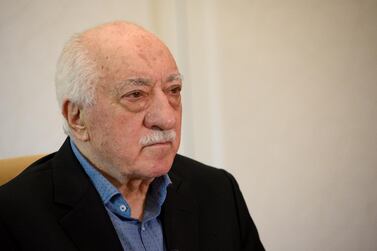Hundreds of accused coup plotters were jailed on Thursday as the largest trial related to Turkey’s bloody failed 2016 putsch came to an end.
The trial of 475 defendants at Sincan prison complex on the outskirts of Ankara for their involvement in trying to overthrow President Recep Tayyip Erdogan began three years ago.
Prison sentences ranged from life without parole for those convicted of attempting to overthrow the constitutional order, murder and attempting to assassinate Mr Erdogan to six years for lesser charges. Seventy defendants were acquitted.
Known as the “Akinci base case” after the military airfield outside the Turkish capital that served as the headquarters for the coup on the night of July 15, the trial had been delayed due to the coronavirus outbreak.
From Akinci, F-16 jets and helicopters took off to bomb Turkey’s parliament, the presidential palace and police headquarters. Civilians were also gunned down in the street as they resisted the soldiers.

Senior military figures who refused to go along with the plot, such as then chief of general staff Hulusi Akar, now Turkey’s defence minister, were also held at the base.
The case was just one of nearly 300 that have been held to prosecute those suspected of involvement in the coup through their accused ties to a religious sect that has spread across the world and which Ankara holds responsible for the failed putsch.
Led by Fethullah Gulen, a former imam who has lived in the US since 1999, the movement has been labelled the Fethullahist Terrorist Organisation, or Feto, by the Turkish authorities.
The group is said to have infiltrated state institutions, including the judiciary, police and military, over many years in a bid to seize power.
Critics of the government have said it has used the failed coup as an excuse to weed out dissent in Turkey. More than 91,000 people have been jailed and some 150,000 dismissed or suspended from their jobs over alleged Feto links.
Aykan Erdemir, a former Turkish MP and senior director of the Turkey programme at the Foundation for Defence of Democracies, said the case demonstrated “significant shortcomings in due process” and had been used to “settle partisan scores”.
“This was a missed opportunity for strengthening the rule of law and improving civil-military relations by ensuring greater transparency and accountability in the Turkish armed forces,” he added.
The defendants on Thursday consisted of 471 former military members as well as four civilians accused of acting as the handlers to Gulenists in the armed forces.
The plaintiffs in the case included Mr Erdogan, MPs, generals targeted by the conspiracy as well as the families of those killed during the coup.
The trial was split between two cavernous halls, with victims’ relatives and others observing proceedings in the second room via a video link.
More than 250 people were killed and some 2,200 wounded on the night of the coup as rogue military units were mobilised in Ankara and Istanbul. Some 30 coup plotters were killed.
A helicopter-borne group of commandos was also ordered to kill or capture Mr Erdogan as he holidayed on the Mediterranean coast but he left minutes before they arrived.
A 4,600-page indictment claimed plans for the coup began after elections the previous year. The four civilians – Kemal Batmaz, Hakan Cicek, Harun Bitis and Nurrettin Oruc – were said to be the core group of plotters, as well as a fifth, Adil Oksuz, who remains at large.
All were captured at or nearby Akinci the morning after the coup. Mr Oksuz escaped after he was released from custody by a judge.
Nineteen defendants, including the four “civilian imams”, generals and F-16 pilots received 79 aggravated life sentences each, according to state-run Anadolu news agency.
The pilots included those who bombed parliament, a TV facility, police bases and the presidential palace in Ankara. The 19 were responsible for the deaths of 77 people killed by ground fire or aerial attacks.
A total of 337 other defendants received life sentences while the remainder received jail terms between six and 16 years.
Mr Gulen, who was tried in absentia, is alleged to be the mastermind of the coup, with Mr Oksuz and Mr Batmaz his chief lieutenants in Turkey. Mr Gulen has denied any involvement and the US has refused to extradite him.
The trial heard from witnesses, listened to control tower recordings and saw video footage from the base that showed senior military officers deferring to the civilian defendants.
Former air force commander Akin Ozturk would have led a post-coup administration to run the country under the title Peace at Home Council. He had claimed he was visiting Akinci on the night of the coup to visit his grandchildren, whose father was an air force officer also involved in the plot.






